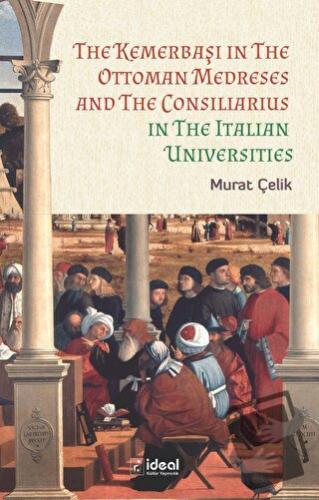The Kemerbaşı In The Ottoman Medreses And The Consiliarius In The Italian Universities

In this book, the concepts of kemerbaşı and consiliarius, both being student organisation/unions, one in the Ottoman medreses and the other one at the Italian universities, will be discussed. Both concepts include an approach to student management in the Ottoman and the Italian higher education. In the study, first of ali, the concepts of kemerbaşı and consiliarius will be discussed and the reasons for their emergence will be emphasized. The qualifications and quantities of each student institution will be pointed out, and their position, authority, and duties in the Ottoman and Italian higher education will be discussed. The result obtained, it is aimed to reveal a position in the Ottoman medrese system that has not been discussed much, and to öpen new subdivisions in the field of the Ottoman education history. In the study, both inductive and deductive methods will be used to discuss the subject, and it can be stated that the study is qualitative. While making these definitions, the use of analogy will also be applied to understand the scales and forms. The sources and data needed for the discussed topic were primarily obtained from Ottoman archival documents. In this respect, Ottoman archive sources were scanned, and the Ottoman chronicles were added to this scan. Secondary sources and research records will then be used to explain each institution and the position of the Ottoman kemerbaşı and the Italian consiliarius.
| Taksit Sayısı | Taksit tutarı | Genel Toplam |
|---|---|---|
| Tek Çekim | 224,00 | 224,00 |
| 3 | 81,60 | 244,79 |
| 6 | 43,08 | 258,47 |
| 9 | 30,24 | 272,18 |
| 12 | 23,82 | 285,85 |
| Taksit Sayısı | Taksit tutarı | Genel Toplam |
|---|---|---|
| Tek Çekim | 224,00 | 224,00 |
| 3 | 81,60 | 244,79 |
| 6 | 43,08 | 258,47 |
| 9 | 30,24 | 272,18 |
| 12 | 23,82 | 285,85 |
| Taksit Sayısı | Taksit tutarı | Genel Toplam |
|---|---|---|
| Tek Çekim | 224,00 | 224,00 |
| 3 | 81,60 | 244,79 |
| 6 | 43,08 | 258,47 |
| 9 | 30,24 | 272,18 |
| 12 | 23,82 | 285,85 |
| Taksit Sayısı | Taksit tutarı | Genel Toplam |
|---|---|---|
| Tek Çekim | 224,00 | 224,00 |
| 3 | 81,60 | 244,79 |
| 6 | 43,08 | 258,47 |
| 9 | 30,24 | 272,18 |
| 12 | 23,82 | 285,85 |
| Taksit Sayısı | Taksit tutarı | Genel Toplam |
|---|---|---|
| Tek Çekim | 224,00 | 224,00 |
| 3 | 81,60 | 244,79 |
| 6 | 43,08 | 258,47 |
| 9 | 30,24 | 272,18 |
| 12 | 23,82 | 285,85 |
| Taksit Sayısı | Taksit tutarı | Genel Toplam |
|---|---|---|
| Tek Çekim | 224,00 | 224,00 |
| 3 | 81,60 | 244,79 |
| 6 | 43,08 | 258,47 |
| 9 | 30,24 | 272,18 |
| 12 | 23,82 | 285,85 |
| Taksit Sayısı | Taksit tutarı | Genel Toplam |
|---|---|---|
| Tek Çekim | 224,00 | 224,00 |
| 3 | - | - |
| 6 | - | - |
| 9 | - | - |
| 12 | - | - |
In this book, the concepts of kemerbaşı and consiliarius, both being student organisation/unions, one in the Ottoman medreses and the other one at the Italian universities, will be discussed. Both concepts include an approach to student management in the Ottoman and the Italian higher education. In the study, first of ali, the concepts of kemerbaşı and consiliarius will be discussed and the reasons for their emergence will be emphasized. The qualifications and quantities of each student institution will be pointed out, and their position, authority, and duties in the Ottoman and Italian higher education will be discussed. The result obtained, it is aimed to reveal a position in the Ottoman medrese system that has not been discussed much, and to öpen new subdivisions in the field of the Ottoman education history. In the study, both inductive and deductive methods will be used to discuss the subject, and it can be stated that the study is qualitative. While making these definitions, the use of analogy will also be applied to understand the scales and forms. The sources and data needed for the discussed topic were primarily obtained from Ottoman archival documents. In this respect, Ottoman archive sources were scanned, and the Ottoman chronicles were added to this scan. Secondary sources and research records will then be used to explain each institution and the position of the Ottoman kemerbaşı and the Italian consiliarius.




















